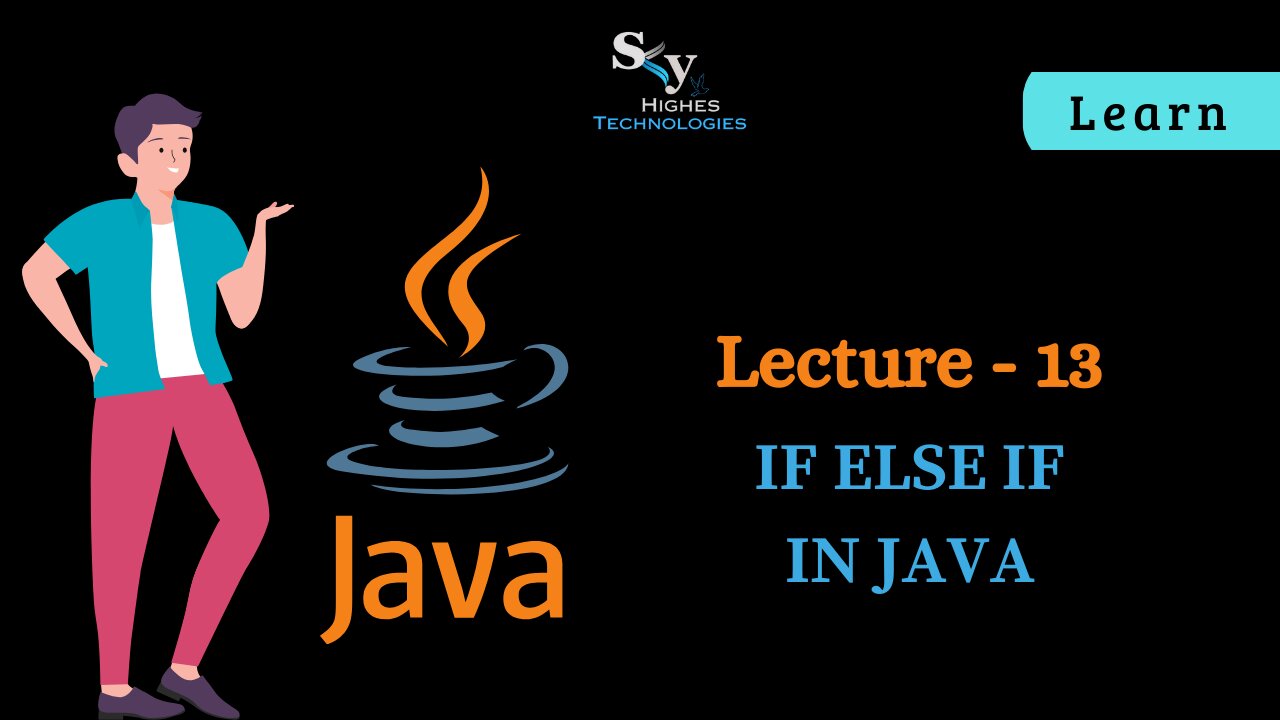Premium Only Content

#13 If Else If in JAVA | Skyhighes | Lecture 13
If-Else-If in Java: The Decision-Making Trio
Think of your Java code as a wise king in a kingdom, facing tough choices based on different situations. The if-else-if statements are the king's advisors, carefully analyzing conditions and suggesting the best course of action.
Let's break down their roles:
King - The if Statement:
Asks the first question: Evaluates a condition (true or false).
Decides the initial path: If the condition is true, the code block within the if statement is executed.
First Advisor - The else if Statement:
Offers alternative scenarios: Presents another condition to be checked if the if condition is false.
Guides the next step: If the else if condition is true, its corresponding code block runs instead of the if block.
Image of wise advisor whispering in the king's earOpens in a new window
satyamparamdheemahi.blogspot.com
wise advisor whispering in the king's ear
Second Advisor - Additional else if Statements (Optional):
More possibilities: You can chain multiple else if statements to consider even more conditions and offer specific responses for each.
Precise decision-making: Each else if acts as a separate advisor, providing a unique path based on its specific condition.
Final Option - The else Statement (Optional):
The catch-all solution: Provides a default code block to be executed if none of the if or else if conditions are met.
Ensures no gaps: Guarantees that the program always takes some action, even if none of the specific conditions apply.
Example:
Java
int score = 75;
if (score >= 90) {
System.out.println("Excellent! You got an A!");
} else if (score >= 80) {
System.out.println("Great job! You got a B!");
} else if (score >= 70) {
System.out.println("Good! You got a C!");
} else {
System.out.println("Keep practicing! You'll improve next time.");
}
Use code with caution. Learn more
Key Points:
Order matters! if comes first, followed by else if statements (in any order), and finally the optional else.
Each else if condition is independently evaluated, only executed if the previous conditions were false.
Use proper indentation for clear readability and to avoid confusion.
Remember: if-else-if statements empower your Java code to make informed decisions based on various scenarios. By mastering them, you'll transform your programs into intelligent beings, responding dynamically to the world around them. So, put on your kingly crown and start building impactful decision-making structures in your Java adventures!
Bonus Tip: Consider using switch-case statements for simpler scenarios with a limited number of distinct conditions.
-
 15:10
15:10
SB Mowing
1 month agoShe had TEARS OF JOY on her face - An update on Beth
8.34K31 -
 LIVE
LIVE
Lofi Girl
3 years agolofi hip hop radio 📚 - beats to relax/study to
149 watching -
 LIVE
LIVE
Nikko Ortiz
1 hour agoLIVE - Trying Rumble Studio!
229 watching -
 9:30
9:30
Sugar Spun Run
4 hours agoBlack and White Cookies
31K1 -
 2:45
2:45
SLS - Street League Skateboarding
4 days agoManny Santiago's 'THIS IS 40' Part
18.3K1 -
 6:40
6:40
Homesteading Family
5 days agoNever Make Pie Crust From Scratch Again (Do THIS Instead)
14.2K1 -
 44:20
44:20
Melissa K Norris
3 days ago $0.20 earnedThe Most Overlooked Way to Preserve Food for Months (No Freezer Needed) w/ Sam Knapp
10K1 -
 23:00
23:00
Tony Jeffries
6 days agoThe Best & Worst Boxing Training Methods (Ranked by Olympic Boxer)
7.06K -
 44:44
44:44
Scammer Payback
17 days agoCrazy Confrontation with Hacked Scammer Group
34K19 -
 1:15:13
1:15:13
Steven Crowder
3 hours agoIt Isn't Both Sides: They Crossed The Rubicon When They Killed Charlie
348K257